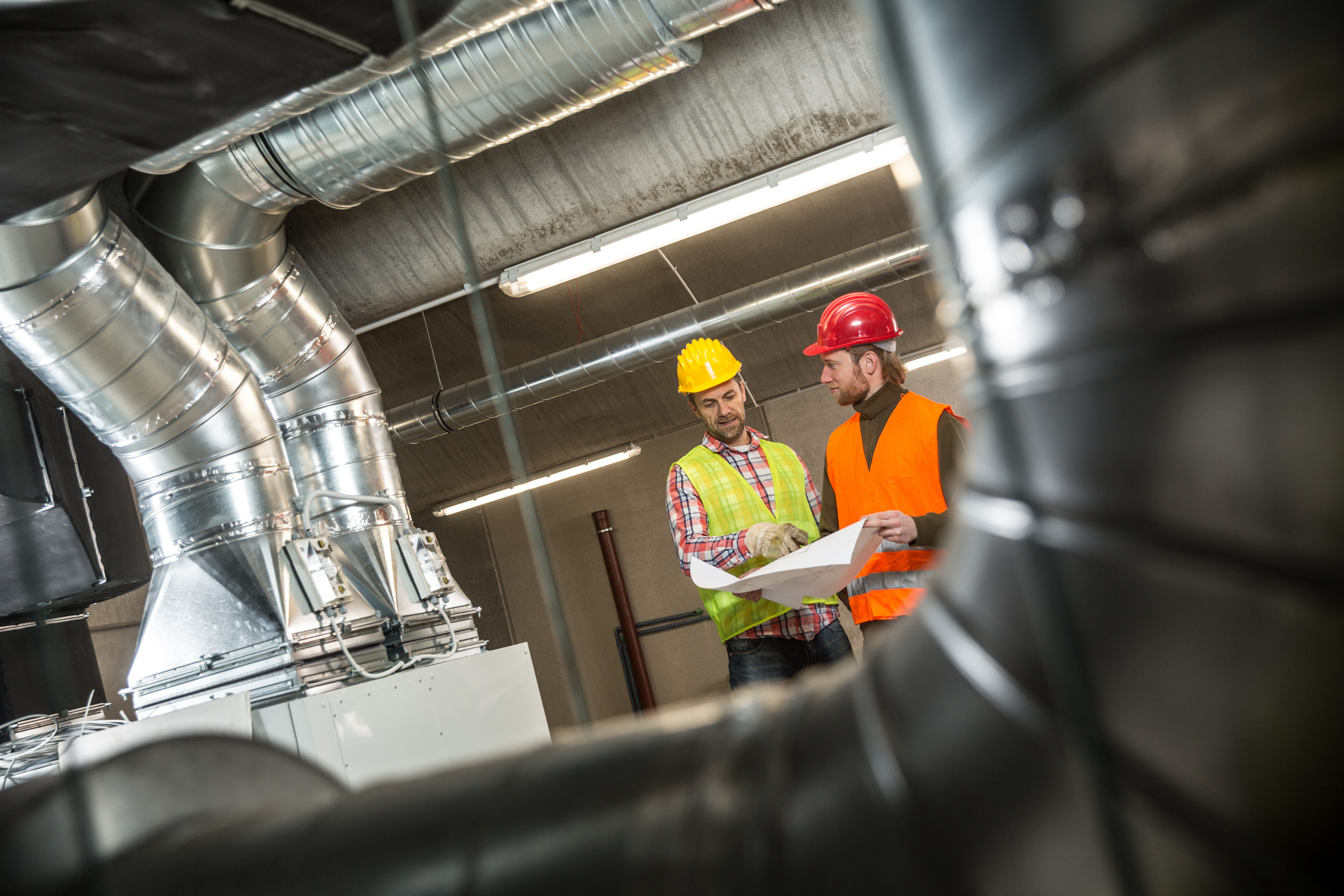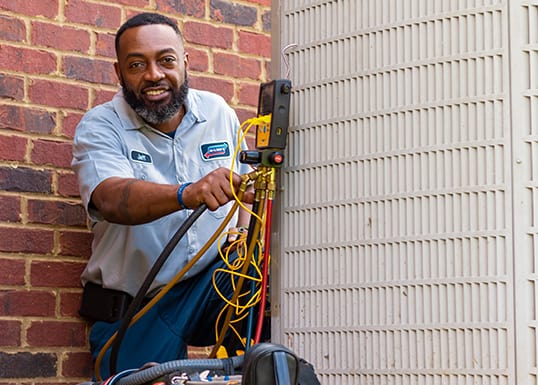Learn how HVAC experts support dependable indoor climate control
Wiki Article
Discovering the Essential Elements of an Effective Cooling And Heating System
An efficient a/c system is constructed on a number of essential components that operate in harmony. Each component, from the thermostat to the ductwork, plays an important function in maintaining comfort and power effectiveness. Comprehending these aspects is vital for enhancing efficiency and enhancing interior air top quality. As one examines these components, the detailed relationships in between them disclose insights into boosting overall system performance. What details aspects contribute most to this efficiency?The Duty of the Thermostat in HVAC Performance

Although commonly overlooked, the thermostat plays an important duty in the effectiveness of cooling and heating systems. HVAC experts. This small device works as the key control facility, managing temperature level settings and making certain suitable comfort within a room. By properly noticing the ambient temperature, the thermostat connects with the home heating, air, and ventilation conditioning units to keep the preferred climate
An effective thermostat lessens power usage by triggering the HVAC system only when essential, thus protecting against extreme heating or air conditioning. Modern programmable and wise thermostats boost this effectiveness even more by allowing users to set routines and from another location change settings, adapting to day-to-day routines.
Furthermore, the positioning of the thermostat is vital; improper location can bring about inaccurate temperature analyses, leading to inefficient procedure. Overall, a well-functioning thermostat not just enhances convenience however additionally adds noticeably to energy financial savings and the longevity of the cooling and heating system.
Comprehending the Importance of Air Filters
Air filters serve an essential function in heating and cooling systems by ensuring that the air flowing within a space remains clean and healthy. These filters trap dust, allergens, and other toxins, preventing them from being recirculated throughout the environment. By recording these particles, air filters add to enhanced interior air top quality, which can greatly benefit residents' health, specifically those with allergic reactions or respiratory system problems.Furthermore, maintaining tidy air filters enhances the efficiency of heating and cooling systems. Stopped up filters can restrict air movement, causing the system to function tougher to maintain wanted temperature levels, leading to enhanced energy intake and higher utility costs. Frequently replacing or cleaning up filters is a crucial upkeep action that can extend the life-span of heating and cooling equipment. Inevitably, comprehending the significance of air filters enables property owners and structure managers to take proactive actions to guarantee a well-functioning, efficient cooling and heating system that promotes a risk-free and comfortable interior atmosphere.

The Performance of the Furnace and Heat Pump
Furnaces and warmth pumps are essential components of heating and cooling systems, responsible for supplying warmth throughout chillier months. Heaters operate by home heating air via combustion or electric resistance, then dispersing it throughout the home using air ducts. They usually use fast heating and can be fueled by all-natural gas, electrical energy, or oil, depending upon the system kind.Conversely, warm pumps transfer warm instead of generate it. They remove warm from the outside air or ground, also in reduced temperature levels, and transfer it inside. HVAC experts. This twin functionality permits heatpump to likewise supply cooling in warmer months, making them versatile choices for year-round climate control
Both systems require proper maintenance to assure effectiveness and longevity. While furnaces master severe cool, heatpump can be beneficial in moderate climates. Understanding their distinctive performances aids home owners in picking the most suitable alternative for their home heating requires.
Exploring the Cooling System
The a/c unit is an essential part of heating and cooling systems, readily available in various types to fit various needs. Understanding the effectiveness ratings of these devices is necessary for making educated selections concerning energy usage and expense. This area will discover the diverse sorts of air conditioning system and clarify how performance ratings effect efficiency.Sorts Of Air Conditioners
While different factors influence the choice of cooling systems, understanding the different kinds available is crucial for house owners and building supervisors alike. Central air conditioning conditioners are created to cool down entire homes or buildings, utilizing a network of ducts for air movement. Window systems supply an even more local service, perfect for small spaces or single rooms. Portable air conditioning system offer adaptability, enabling individuals to move the unit as required. Ductless mini-split systems are another option, combining the performance of central systems with the ease of zoning, as they need no ductwork. Geothermal systems harness the planet's temperature for energy-efficient cooling. Each kind comes with distinctive advantages, making educated choices vital for reliable environment control.
Effectiveness Scores Described
Comprehending effectiveness scores is necessary for selecting the best cooling system, as these metrics provide understanding into the system's performance and power usage. The most common ranking for air conditioning unit is the Seasonal Power Effectiveness Ratio (SEER), which gauges the cooling output throughout a regular cooling period split by the total electrical power input. A higher YOURURL.com SEER indicates far better effectiveness. In addition, the Power Efficiency Proportion (EER) is utilized for determining effectiveness under certain problems. An additional vital metric is the Power Star certification, which signifies that a system fulfills rigorous energy performance guidelines. By reviewing these ratings, customers can make informed selections that not only maximize convenience but additionally decrease power expenses and ecological effect.The Relevance of Ductwork and Air movement
Effective ductwork design and airflow administration play essential duties in the general efficiency and performance of cooling and heating systems. Proper ductwork warranties that conditioned air is dispersed evenly throughout a space, reducing temperature fluctuations and improving convenience. Well-designed air ducts decrease resistance to air flow, minimizing the workload on heating and cooling devices and ultimately lowering power intake.Air movement administration involves purposefully putting vents and registers to enhance the flow of air. This avoids typical issues such as hot or cold spots, which can occur when air movement is obstructed or inadequately balanced. Additionally, the right air duct materials and insulation can even more improve efficiency by minimizing heat like it loss or gain during air transportation.
An effective ductwork system not just contributes to energy cost savings but can likewise lengthen the life expectancy of cooling and heating devices by lowering unneeded stress (HVAC experts). Recognizing the value of ductwork and airflow is vital for achieving peak A/c system performance.
Routine Upkeep Practices to Improve Efficiency
Routine upkeep techniques are crucial for making sure peak performance of cooling and heating systems. These practices consist of regular assessments, cleaning, and needed fixings to keep the system running effectively. Consistently altering air filters is vital, as clogged filters can obstruct air flow and lower performance. In enhancement, service technicians should inspect and clean evaporator and condenser coils to avoid overheating and power waste.Annual expert examinations are likewise recommended, as qualified specialists can recognize possible concerns before they intensify. Lubricating relocating components reduces damage, adding to a longer life-span for the system. In addition, making sure that the thermostat operates home properly help in maintaining ideal temperature level control.

Regularly Asked Inquiries
Just how Often Should I Replace My Thermostat?
Thermostats need to usually be changed every 5 to ten years, relying on usage and technology advancements. Regular checks are recommended to ensure peak performance, especially if experiencing irregular temperature control or increased energy expenses.What Dimension Air Filter Is Best for My HVAC System?
The ideal dimension air filter for an a/c system differs by system layout. Normally, it's vital to get in touch with the proprietor's guidebook or check the existing filter measurements to assure peak performance and air quality.Can I Install a Heatpump Myself?
Installing a heatpump individually is feasible for knowledgeable individuals, but it calls for knowledge of regional codes and electrical systems. Working with a professional is recommended to guarantee correct installment and ideal system efficiency.Just how Do I Know if My Ductwork Is Effective?
To identify ductwork performance, one need to look for leakages, measure air movement at vents, examine insulation quality, and evaluate temperature differences in between supply and return air ducts. Expert analyses can give comprehensive understandings into general performance.What Are Indications My A/c Requirements Immediate Maintenance?
Signs that a cooling and heating system requires prompt maintenance consist of unusual sounds, irregular temperature levels, enhanced power costs, unpleasant odors, and regular cycling. Addressing these concerns quickly can stop further damage and assurance optimal system efficiency.Air filters serve an important function in Cooling and heating systems by ensuring that the air circulating within an area continues to be healthy and balanced and clean. Additionally, maintaining clean air filters boosts the efficiency of Heating and cooling systems. Ductless mini-split systems are one more choice, incorporating the efficiency of central systems with the comfort of zoning, as they require no ductwork. Understanding efficiency rankings is vital for choosing the best air conditioning device, as these metrics give understanding into the system's efficiency and energy usage. The ideal dimension air filter for a HVAC system differs by unit design.
Report this wiki page